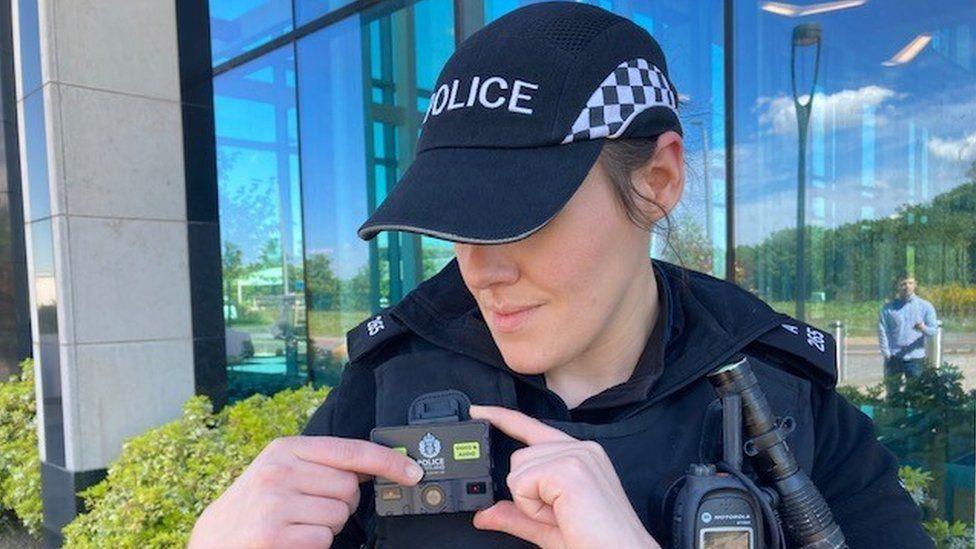Police Scotland body-worn cameras delayed until next year

- Published
Police Scotland officers will not start to receive body-worn cameras until next year despite the force previously hoping to introduce them this summer.
The service is the second largest in the UK after the Met but is the only one not to have body-worn video as standard equipment.
Chief Constable Jo Farrell told MSPs there was still a "significant" amount of work to be done before officers can be equipped with cameras in the Ā£13.3m project.
But police in the Tayside division should be the first rank-and-file officers to receive them next spring.
Body-worn video is seen as an important evidence-gathering tool and a safeguard against assaults on officers and vexatious complaints.
The chief constable was giving evidence to the Scottish Parliament's criminal justice committee on the support given to police officers over their mental health and wellbeing.
The MSPs were also told that 20 police officers and staff have taken their own lives in the 11 years since the national force came into being.
- Published20 December 2023
- Published1 September 2023
- Published1 June 2021
In June, Police Scotland agreed a national contract with Motorola Solutions UK to supply 10,500 cameras and back-office systems.
The chief constable told MSPs: "There is almost no greater priority for us than rolling this out.
"No-one wants it more than I do because I can absolutely see the benefits.
"Putting cameras on officers' shoulders is straightforward. It's ensuring that it has national capability and is able to feed into the criminal justice system."
Police body-worn cameras have been used in some parts of Scotland but a national rollout has been delayed
The new technology will be integrated with a digital evidence platform which allows video to be shared with prosecutors, defence lawyers and the courts.
The Scottish Police Federation, which represents officers up to the rank of chief inspector, said it understood the project's complexity but the delay was causing concern.
Federation chairman David Threadgold said: "Officers are continually saying to me, when is this happening?
"The benefits are clear in terms of interactions with the public, reduced complaints, reduced assaults, so the sooner we have it the better."
'Relentless' pressure on officers
Scottish Conservative MSP and committee member Russell Findlay said the former Grampian Police force had first tried body-worn video in 2012 and described the latest timetable as "unacceptable."
"It's been a delay of more than 10 years," he said. "We're the only police force in the UK without them."
The police federation told the committee the pressure on frontline officers was "relentless," with 60-70% of their operational capacity taken up by calls involving mental health.
Mr Threadgold said 3,500 officers had not been through the latest safety training on de-escalation techniques and the use of batons and handcuffs.
"The consequence of that is my colleagues are going out there without the most up-to-date training that they possibly can receive," he said.
"There's clear evidence that when that's the situation, there's an increase in assaults on officers, and there's a clear link with that and those who are absent with physical and psychological issues."
The Association of Scottish Police Superintendents told the committee that a growing number of officers were unable to carry out full operational duties, and more were leaving the service early in their careers.
In its submission to the committee, the force said it was investing Ā£17m on enhanced welfare provisions, with a new 24/7 employee assistance programme and a greater focus on mental health support.
Deputy Chief Constable Alan Speirs said the force was taking on more new recruits than ever before and was "half an intake away" from getting back up to its target of having 16,600 officers.
The Scottish Police Authority, which oversees Police Scotland, said the force ānow has the foundations and commitment to improve wellbeing across the service.ā